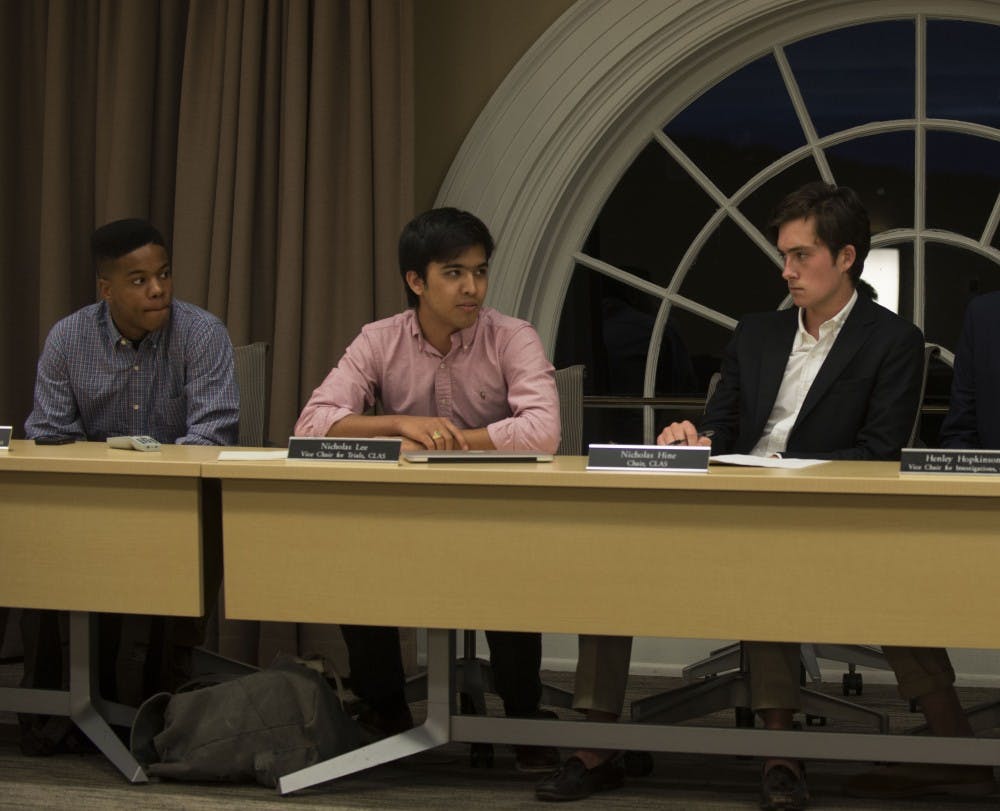The Honor Committee decided on a temporary solution to the procedural ambiguity it has faced in cases of bad debt, opting to deal with cases by relying on previous bylaws while Committee members continue to explore long-term solutions.
Honor Chair Nicholas Hine, a fourth-year College student, said Committee members found it made sense to follow the guidance of former bylaws and enact already-codified procedures.
“What we decided to do was that, should [more] and more bad debt cases come up, we’re going to handle them using the procedures outlined in the bylaws from two iterations ago, that were used in [a] large part of the 2013 term,” Hine said.
The short-term decision to rely on old bylaws leaves much of the power over bad debt cases with the vice chair for community relations — currently third-year College student Martese Johnson.
“The VCCR essentially [will have] the discretion to issue letters of notice of bad debt and also to file Honor charges against someone, as well as investigate informal investigations into these bad debt cases,” Hine said.
The VCCR, however, has not always had such a large influence in the determination of which bad debt cases should be investigated.
“In the past there was an ad hoc committee that handled the issue, but because there weren’t many instances, that power moved over time to VCCR,” Hine said. “The conversation going forward will be on whether or not we want all that discretion under the power of the VCCR.”
As the current set-up stands, the VCCR will be responsible for giving judgment on ambiguous bad debt circumstances, such as a student not who has not paid a debt because he or she is financially unable.
Some committee members expressed discomfort with not having outlined rules for how to deal with such situations, instead relying on the interpretation of an individual.
Fourth-year College student Henley Hopkinson, the vice chair for investigations, said when considering students who may be financially unable to pay back a debt, he did not like leaving the determination to individual judgment.
“I am slightly uncomfortable with the notion of relying on [interpretations] as fail-safes,” Hopkinson said. “If we are fundamentally concerned with the fact that a student simply might not be able to pay rent, I don’t think we should say, ‘Well, most likely the significance criteria will rule that out.’ I think we need to address it head on.”
The Committee is also looking to address its current practice of sending bad debt letters — notices sent by the Committee to students whom another party has signaled as failing to pay a debt.
Hine said the current format of the letters presumes guilt and, in the mind of the recipient, unwillingly places the Committee on the side of the accusing party.
“We’re going to take a hard look at the letters,” Hine said. "They come off as quite accusatory."
As part of reforming the letters, the Committee is considering mentioning to students the possibility of procuring an Honor loan. Honor loans are interest-free loans given to students by the Office of the Dean of Students. Students are then required, on their honor, to pay back these loans, which amount to up to $600.
“One of the things we might including in the [bad debt letters] is that, for smaller monetary disputes, one of the things students have available to them is an Honor loan,” Hine said. “These Honor loans have already existed, [but] we haven’t done a good job advertising that.”
These loans could potentially allow for less stressful and antagonistic discussions between students and the party which feels shortchanged, Hine said.
“We could offer the Honor loan so that [students] can clear up the dispute with whoever, and have a little more leeway,” he said.







